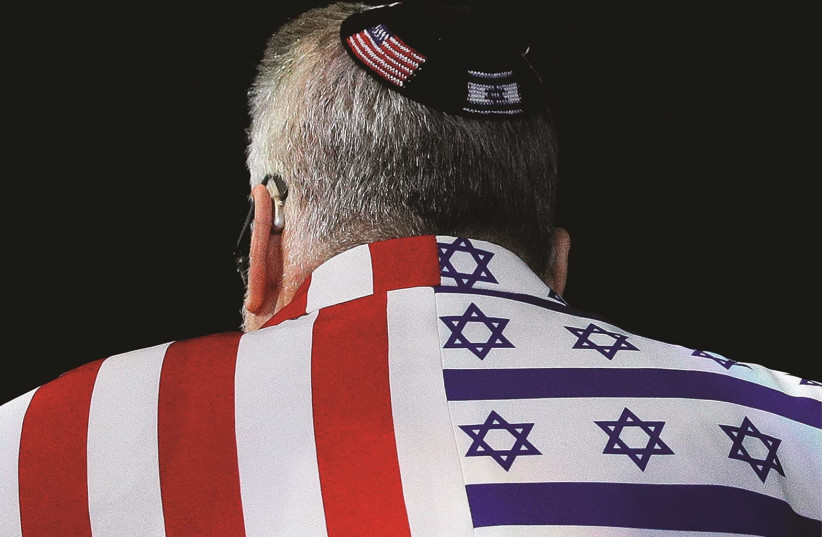WASHINGTON – AIPAC surprised many observers last week with the announcement that it would establish two new PACs that will allow the pro-Israel lobby to directly fund political campaigns.
That was a major shift after 70 years in which the American Israel Public Affairs Committee avoided entering the campaign arena in order to be able to balance relationships with both sides of the aisle. However, some experts believe that in the current political climate, it should come as no surprise that AIPAC would decide to make that strategy shift.
“The only thing that’s surprising about AIPAC’s decision to enter into campaign funding is that it took the group so long to do this,” said Prof. Dov Waxman, director of the UCLA Y&S Nazarian Center for Israel Studies. The defeat of pro-Israel stalwarts such as Eliot Engel in Democratic primaries in the run-up to the 2020 election was “a clear warning signal that pro-Israel PACs needed to do more to defeat politicians deemed to be ‘anti-Israel’ or reelect ‘pro-Israel’ ones,” he said.
“Although for decades AIPAC has had informal ties with pro-Israel PACs, it has always refrained from forming its own PAC,” he added. “I think its decision to establish its own PAC and super PAC is based on the recognition that campaign funding is a crucial means of exerting political influence in Congress, and that AIPAC now needs this tool in order to maintain its influence in Congress and remain the preeminent pro-Israel lobby group.
“AIPAC’s rival, J Street, has had its own PAC since it was founded. I expect AIPAC’s PAC, and especially its super PAC, will particularly be deployed to support moderate pro-Israel Democrats against progressive rivals who are outspoken in their criticism of Israel,” Waxman said.

Last week, AIPAC president Betsy Korn said the organization would launch “two bipartisan political action committees – a federal PAC and a super PAC – to make us more effective in fulfilling our mission in the current political environment.”
According to AIPAC officials, the PAC will be led by Marilyn Rosenthal, and the super PAC will be headed by Rob Bassin.
“The creation of a PAC and a super PAC is an opportunity to significantly deepen and strengthen the involvement of the pro-Israel community in politics,” AIPAC spokesman Marshall Wittmann said.
“The PACs will work in a bipartisan way,” he added.
Establishing a PAC and funding political campaigns while remaining a bipartisan organization could be a complicated task, according to former White House press secretary Ari Fleischer.
“This will be controversial, but everything is controversial these days,” he said. “The risk here is that AIPAC is providing critics an immediately measurable way of gauging if AIPAC gave more money to Republicans than Democrats, or vice versa.
“It won’t matter if one party is more pro-Israel than the other; AIPAC will be accused of leaning one way or the other. It’s a sign of how much influence AIPAC once had but has now lost that they feel the need to create a PAC,” Fleischer said.
Tom Dine, a former head of AIPAC (1980-1993), addressed that point as well.
“The long-term key to American politics is bipartisanship,” he told The Jerusalem Post. “The key to any AIPAC political action committee will be bipartisanship. Only time will tell. I support creating one, two or three PACs under AIPAC’s auspices, but only if the entities are logically about a stronger US-Israel partnership, not about one party over another. I will be watching closely.”
What is the financial meaning of establishing a PAC?
“A PAC can only contribute $5,000 to each campaign, but it is also allowed to coordinate with the campaign directly,” said one Washington expert who asked not to be named. “The super PAC is completely independent, and it can accept unlimited contributions and can spend unlimited amounts. A super PAC can spend $5,000 or $5 million on a campaign if they want.”
“We don’t know yet how these races are going to look because redistricting is still being challenged in courts, and the map is not clear,” the expert said. “You’re going to have races with potential pro-Israel candidates running against anti-Israel incumbent candidates. Then you’re going to have to have elections where pro-Israel Democrat champions will be challenged by pro-Israel Republicans. And in that case, you need to make decisions about where you are getting extra money. I have no idea how they’re going to make their decisions.”
According to Michael Oren, a former Israeli ambassador to the US, “The deepening polarization in American politics generally, and regarding Israel specifically, created a situation in which AIPAC could no longer remain above the campaign-finance fray.” The approaching mid-term elections will be a litmus test of AIPAC’s new policy, he added.
Steve Rabinowitz, a Democrat strategist and the founder of BlueLight Strategies, said: “After decades of insisting they were not a PAC, do not endorse candidates and are not even particularly political, suddenly AIPAC has announced it will become all three. Now, at least, there’s no more pretending; it’s all honest and public.”
Philip Rosenzweig, chairman of the Republican Committee of Lower Merion and Narberth, which encompasses the first 14 towns of Philadelphia’s Eastern Main Line, said AIPAC’s choice is natural, given the circumstances.
“I strongly believe that AIPAC forming a PAC is a direct result of the increasing partisanship,” he said. “Israel is now a much more partisan issue. And I hate that fact, even as a partisan myself. So I believe AIPAC has rightly determined that its old ways of fostering the bipartisan support for Israel are less effective, and that a PAC will allow them to directly support pro-Israel candidates.”
“This strategic shift is reactive to the new situation ‘on the ground’ and is likely to either further polarize partisanship if AIPAC’s PAC winds up over-contributing to Republicans, or it will help Democrats who strongly support Israel to become unshackled from Democrat establishment campaign funding sources, [which restrain] those candidates’ free expression of their support,” Rosenzweig said.
